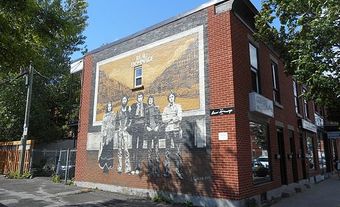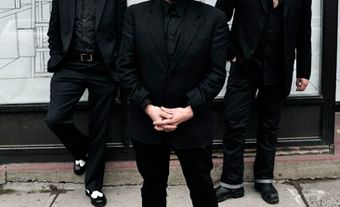ARC Ensemble
The ARC (Artists of the Royal Conservatory) Ensemble is the chamber group in residence at the Royal Conservatory of Music (RCM) made up of senior faculty at the Glenn Gould School (GGS). They have won international acclaim and are particularly known for their imaginative and thematic programmes exploring music of the Holocaust.Performers
Created in 2002 and directed by Simon Wynberg, the ensemble consists of eight musicians expanded as needed with GGS students and guest artists. In 2012 the core musicians were violinists Marie Bérard, Erika Raum, and Benjamin Bowman, violist Steven Dann, cellist Bryan Epperson, pianists Diane Werner and David Louie, and clarinetist Joaquin Valdepeñas. Other musicians who have played with ARC have included Mark Fewer and Atis Bankis (violins), Yosef Tamir (viola), David Hetherington (cello), and Joel Quarrington (bass). Conductors Marc Neikrug and Alain Trudel have appeared in series that the ARC has presented, and James Conlon has been named Honorary Chairman. Special guest artists have included pianist Leon Fleisher, author Yann Martel, and actor/director Saul Rubinek.
Programmes and Tours
In their inaugural season (2002-2003) ARC presented the Young (Richard) Strauss and Brothers in Brahms. In 2003-2004 Music Reborn, partnered with the ROM, featured works by composers who had suffered in the Holocaust. A major highlight was the lecture by Gottfried Wagner, musicologist/writer/director and founder of the Post-Holocaust Dialogue Group and the great -grandson of Hitler's preferred composer. Also that season A Green and Pleasant Land featured music by Britten, Elgar, Vaughan Williams and Rebecca Clarke, and poetry by John Masefield, A.E. Houseman and Christina Rossetti among others. Reelmusic explored chamber music by film composers (2005), and the music of Julius Röntgen was featured in Julius Who? Neglected Genius (2006).
In 2007-8, ARC presented Music in Exile, by composers whose careers were truncated by exile, death or Nazi persecution: Karl Amadeus Hartmann, Heinrich Kaminski, Alexander Tansman, Mieczyslaw Weinberg, Karl Weigl, Kurt Weill, and Alexander Zemlinsky among them.
Émigré Composers of the 1930's appeared in New York, Washington D.C., London (England), Budapest, Rome, and cities in Sweden, and Poland. It consisted of concerts, lectures, films and illustrated discussions in collaborations between the RCM and local institutions, and has revived lost or forgotten music. Also featured were composers Franz Reizenstein, Mátyás Seiber, Robert Kahn, Walther Braunfels who was half Jewish and risked remaining in Germany (String Quintet op 63), and Adolph Busch mainly remembered a violinist (String Sextet in G major Op 40). Although not Jewish, Busch was unsympathetic to the Nazi regime and emigrated to the USA where he and Rudolph Serkin founded the Marlborough Music School and Festival. ARC's 2010-11 season included Music in Exile for Toronto's Holocaust Education Week: Conscience and Accountability in the Third Reich.
ARC's performances in Canada have included at the Vancouver Cultural Olympiad and Vancouver's Chutzpah Festival (2010). The ensemble has performed at Amsterdam's Concertgebouw, and toured Israel in 2011 where its members gave master classes at the Buchmann-Mehta Music Academy.
In September 2012, ARC performed and toured in Germany to acclaim. Among works on the program were Samuel Gardner's Hebrew Fantasy for Clarinet Quintet, Israeli composer Paul Ben- Haim's Clarinet Quintet Op 31a, and Polish composer Mieczyslaw Weinberg's Clarinet Sonata and Piano Quintet op 18.
Recordings
ARC has recorded on RCA Red Seal, earning both Grammy and Juno nominations: Two Roads to Exile presents music by Walter Braunfels and Adolf Busch; Right Through the Bone that by Julius Röntgen. On the Threshold of Hope showcasing works by Shostakovich's protégé Miecyzslaw Weinberg, was recorded at Toronto's George Weston Hall (2006).
Beginning 2011 ARC has been represented in Europe by the prestigious agency Koncertdirektion Schmid.

 Share on Facebook
Share on Facebook Share on X
Share on X Share by Email
Share by Email Share on Google Classroom
Share on Google Classroom


